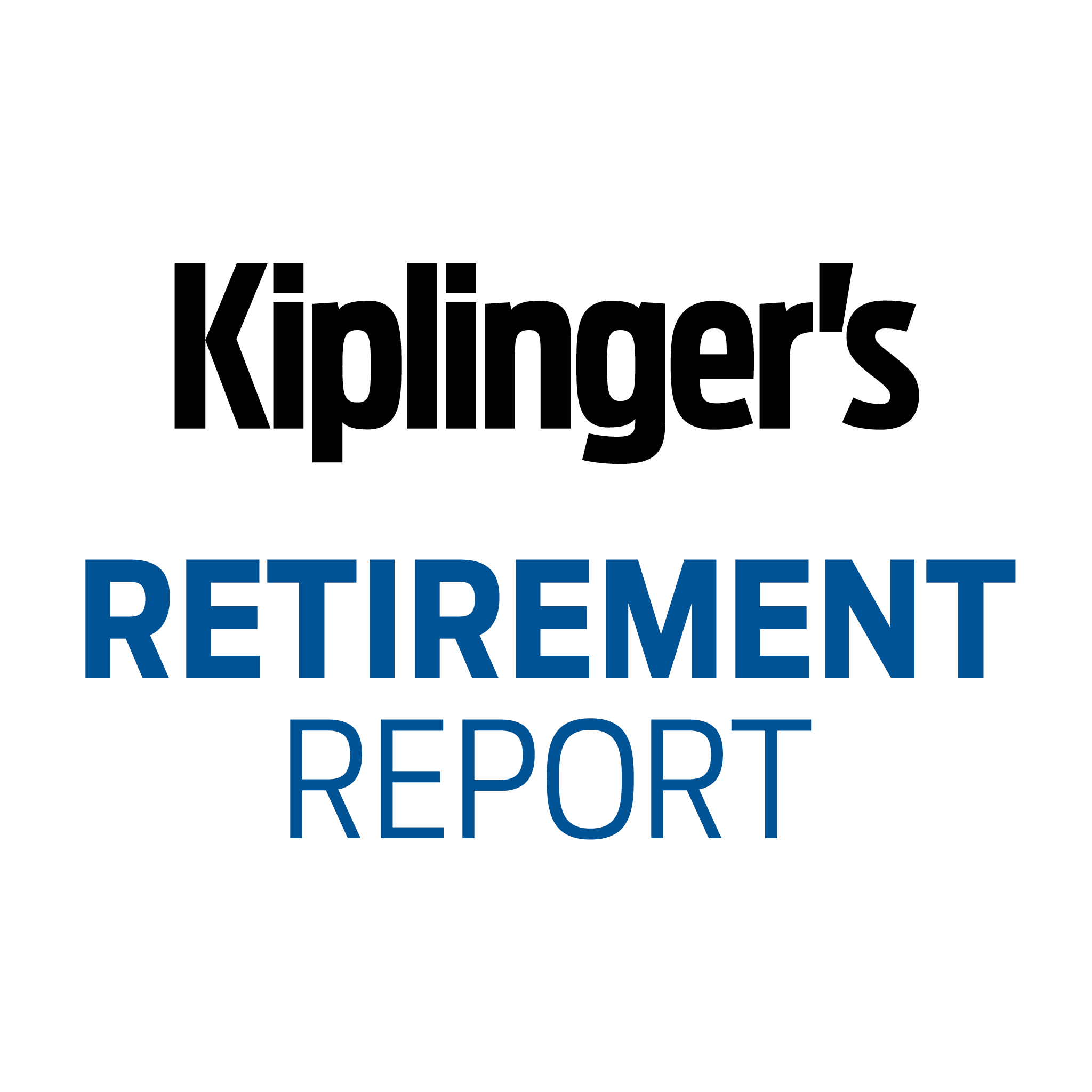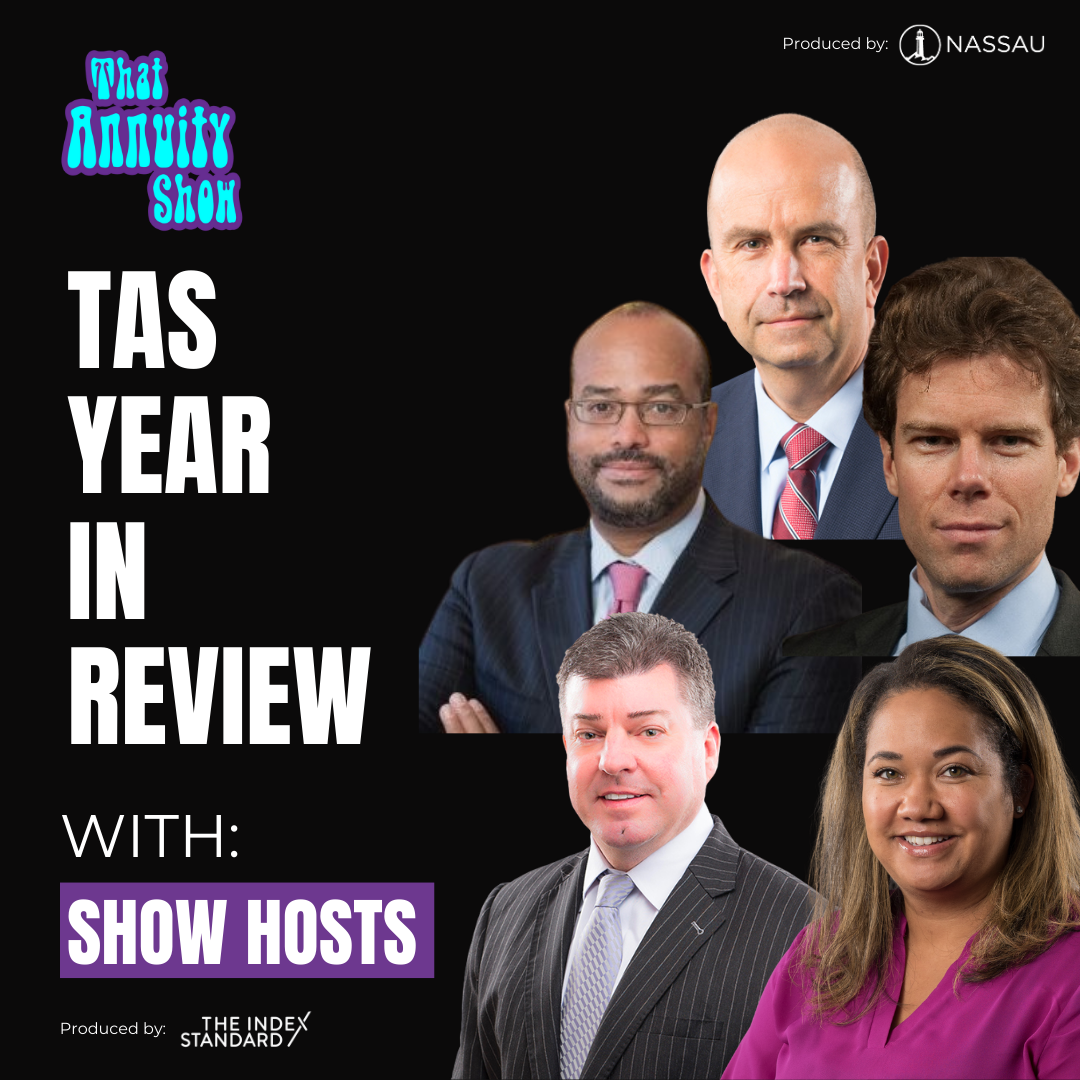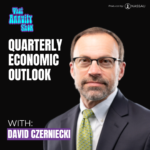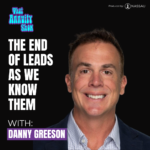paul_tyler:
hi this is paul tyler and welcome to another episode of that annuity show in fact this is
ramsey_d_smith:
yeah
paul_tyler:
episode one hundred and seventy
ramsey_d_smith:
oh
paul_tyler:
eight and it’s the first week your ramsey how are you
ramsey_d_smith:
it very glad
paul_tyler:
oh
ramsey_d_smith:
to be back amazing that we’re already
bruno_caron:
yeah
ramsey_d_smith:
almost to
paul_tyler:
yeah
ramsey_d_smith:
a hundred and hundred and eighty episodes
paul_tyler:
yeah
ramsey_d_smith:
and very happy
paul_tyler:
yeah
ramsey_d_smith:
to be in a new year i think twenty twenty two asked much of all of us this time for
paul_tyler:
ah
ramsey_d_smith:
a fresh start
paul_tyler:
no kidding bruno
ramsey_d_smith:
m
paul_tyler:
what a year
bruno_caron:
what are your
paul_tyler:
oh
bruno_caron:
echoing
paul_tyler:
oh
bruno_caron:
ramsey’s comments of course i think a fresh start is going to be is going to be beneficial
paul_tyler:
oh
bruno_caron:
and i’m looking forward to it
paul_tyler:
tis a good to see you here happy new year
bruno_caron:
oh
tisa_rabun_marshall:
happy new year
bruno_caron:
yeah
tisa_rabun_marshall:
yeah fresh
paul_tyler:
yeah
tisa_rabun_marshall:
starts always good i agree with bruno so looking forward to
ramsey_d_smith:
m
bruno_caron:
yeah
tisa_rabun_marshall:
what’s
paul_tyler:
oh
tisa_rabun_marshall:
ahead for twenty twenty three
paul_tyler:
well i’m going to tell you i’ll set up this this conversation was just sort of a little bit of back story
ramsey_d_smith:
oh
paul_tyler:
i’ve been
bruno_caron:
oh
paul_tyler:
very lucky with travel so over the winter i kind of dodged the ice storm
bruno_caron:
m yeah
paul_tyler:
i picked i was lucky enough to pick the right air long had
bruno_caron:
uh
paul_tyler:
no cancelations same thing this week i was actually just
ramsey_d_smith:
m
paul_tyler:
came back from tampa yesterday where we had a meeting with you know one of our hosts mark fitz gerald our sales team
bruno_caron:
yeah
paul_tyler:
product came down really look at what happened last year and also think about what’s happening next year next year
bruno_caron:
oh
paul_tyler:
this year twenty twenty three and we thought it made sense to you know kind of do the same thing with with our show we covered a lot of ground
ramsey_d_smith:
yeah
paul_tyler:
with a lot of spect acular
ramsey_d_smith:
m
paul_tyler:
guests
bruno_caron:
oh
paul_tyler:
and some of our guests actually
ramsey_d_smith:
yeah
paul_tyler:
turned into host bruno
bruno_caron:
um
paul_tyler:
you know you joined our our line up tisza
ramsey_d_smith:
m
paul_tyler:
you did as well
tisa_rabun_marshall:
oh
paul_tyler:
and
bruno_caron:
yeah
paul_tyler:
which has been terrific addition over the last last couple of months bruno you changed jobs
bruno_caron:
oh
paul_tyler:
right went from the regulator regulation side to the business which is
ramsey_d_smith:
oh
paul_tyler:
which
bruno_caron:
m
paul_tyler:
is great so
bruno_caron:
that’s
ramsey_d_smith:
m
paul_tyler:
so rams what do you think if i throw out a few topics that we covered
bruno_caron:
oh
paul_tyler:
and you know just
bruno_caron:
oh
paul_tyler:
i guess think about you know first of all think back to what we what we covered last year and then what we think will continue into next year and some of the topics we think that may be new that may be a war be much more important than
bruno_caron:
oh
paul_tyler:
war in twenty twenty three than twenty twenty two how
bruno_caron:
yeah
paul_tyler:
does that sound
ramsey_d_smith:
makes sense a rock and roll
paul_tyler:
all right
bruno_caron:
yeah
paul_tyler:
so i don’t know i think we couldn’t have a conversation on this show if
ramsey_d_smith:
m
paul_tyler:
we didn’t have regulations
ramsey_d_smith:
oh
paul_tyler:
somewhere in the mix you know we kicked off last year
bruno_caron:
oh
paul_tyler:
pulling in our one of our you know
bruno_caron:
oh
paul_tyler:
you know two top attorneys
ramsey_d_smith:
ah
bruno_caron:
yeah
paul_tyler:
eric marhoon and halymonmaldonat
bruno_caron:
yes
paul_tyler:
talk about the implementation do believe this i think it was back in january the implementation of best enter standards
tisa_rabun_marshall:
oh
paul_tyler:
right and then
bruno_caron:
yeah
paul_tyler:
we actually ended up pulling in you know kimo brian an industry association group to talk about
ramsey_d_smith:
m
paul_tyler:
you know a lot of the industry’s plans to get regulators and the courts to reconsider some of the regulation you know where do we land i mean i don’t know did this landscape really change or not i’ll throw that out i don’t know three view
bruno_caron:
at the very least i
paul_tyler:
yeah
bruno_caron:
think that the good news is that e’re talking about it and things are moving forward is as it is with all right latin
paul_tyler:
ah
bruno_caron:
it’s very hard to see the direct impact but
paul_tyler:
what
bruno_caron:
but our prior show we had we had very very good comments and very good very good feedback that things made sense things were logical and
ramsey_d_smith:
oh
bruno_caron:
so from from that
paul_tyler:
m
bruno_caron:
standpoint i think we’re going in the right direction i think is there a lot of work to be done yes of course but i think
paul_tyler:
oh
bruno_caron:
at least the discus and it’s taken place at
paul_tyler:
yah h
bruno_caron:
the regulatory level
paul_tyler:
yeah
ramsey_d_smith:
i guess
bruno_caron:
oh
ramsey_d_smith:
from my perspective i think it’s
bruno_caron:
m
ramsey_d_smith:
i think it’s an important converse conversation like best interest is an important conversation i think it’s important that whether it’s regulators
bruno_caron:
oh
ramsey_d_smith:
or the
bruno_caron:
yeah
ramsey_d_smith:
you know or the industry
bruno_caron:
yeah
ramsey_d_smith:
um proceed with intentionality towards towards best interest standards the the challenge then
paul_tyler:
m
ramsey_d_smith:
becomes one of implementation and
bruno_caron:
yeah
ramsey_d_smith:
product structures and comp satan structures and just sort of historic culture in different sort of elements of the financial services industry it ultimately ends up
bruno_caron:
ah
ramsey_d_smith:
creating creating conflicts in terms of figuring out the best way to implement things so we’ve had one of our i think r most popular or most regular guests and popular and most regular guest has been michelle rictorshe is devoted
paul_tyler:
m
ramsey_d_smith:
a lot of time and energy to
bruno_caron:
yeah
ramsey_d_smith:
know to articulating um articulating the what it will take to create a sort of a fad or a standard in the insurance the insurance space and
paul_tyler:
yeah
ramsey_d_smith:
and why there’s
paul_tyler:
yeah
ramsey_d_smith:
why there’s a need for that and so i think this is i think there is a continued work in progress i think it’s important and end and largely from from my perspective i think it’s a i think it’s a conversation that needs to incorporate every every element of every sleeve of financial fassionals that serve that serve consumers so it’s not just the insurance industry it’s you knowproduciary
paul_tyler:
ye
ramsey_d_smith:
advisors should they be paid based on a ump should they be plased pay hourly should they be
paul_tyler:
oh
bruno_caron:
yeah
ramsey_d_smith:
paid flat fees that’s a debate i think
paul_tyler:
oh
ramsey_d_smith:
there’s just as much would the chop there around
paul_tyler:
m
bruno_caron:
yeah
ramsey_d_smith:
conflicts of interest as the re as there is in the the insurance side so i think we need to we need have a wholistic dialogue there across everybody who services the industry to get to the right answer
paul_tyler:
and in so you were involved in a lot of the implementation of some
tisa_rabun_marshall:
oh
paul_tyler:
of the regulatory changes and it was if i had seen the list of changes coming i would have tought this would have been a big deal for advisers i mean we had the
ramsey_d_smith:
yeah
paul_tyler:
best inter standards we had changes in arm de rols being implemented we had
tisa_rabun_marshall:
hm
paul_tyler:
income statement showing in people’s for one case statements first thing what do you think if we did
ramsey_d_smith:
yeah
paul_tyler:
a pole of agents was this a monumentally new environment or was it same as usual
tisa_rabun_marshall:
yeah i mean i agree with ramsey
paul_tyler:
yeah
tisa_rabun_marshall:
right the intent is right protecting clients and consumers best interest but i think the flaw is in the implementation or the challenges in the implementation where now
paul_tyler:
ye
tisa_rabun_marshall:
see the process bog down with paper work
bruno_caron:
okay
tisa_rabun_marshall:
over documentation
paul_tyler:
oh
tisa_rabun_marshall:
process changes and
ramsey_d_smith:
yeah
bruno_caron:
ah
tisa_rabun_marshall:
agents don’t like to change right the way that they’re selling they have a system they have a process that they know so i think it was more disruptive in the form of just how
ramsey_d_smith:
m
tisa_rabun_marshall:
you work with clients and for clients i think it was just confusing nancial services are already
bruno_caron:
yeah
tisa_rabun_marshall:
confusing
paul_tyler:
oh
bruno_caron:
oh
tisa_rabun_marshall:
the products re already confusing the process is already confusing and then adding in additional layers of
ramsey_d_smith:
m
bruno_caron:
oh
tisa_rabun_marshall:
paper work and signatures and
bruno_caron:
my
tisa_rabun_marshall:
signing off men we got a lot of feed back in the language of trying to understand like who’s getting compensated for this and
paul_tyler:
yeah
bruno_caron:
yeah
tisa_rabun_marshall:
why and why am i signing this and what
ramsey_d_smith:
uh
tisa_rabun_marshall:
does it mean so
paul_tyler:
you what’s a p t a
ramsey_d_smith:
yeah
paul_tyler:
form
bruno_caron:
oh
tisa_rabun_marshall:
the
paul_tyler:
right
tisa_rabun_marshall:
intent is that
paul_tyler:
ye
tisa_rabun_marshall:
is correct but
ramsey_d_smith:
m
tisa_rabun_marshall:
i think the implementation
bruno_caron:
oh
paul_tyler:
ye
tisa_rabun_marshall:
and really making sure that
paul_tyler:
he
tisa_rabun_marshall:
customers understand the why and agents and still
paul_tyler:
oh
tisa_rabun_marshall:
easily run their business is where the where the
paul_tyler:
a
tisa_rabun_marshall:
challenge is
paul_tyler:
yeah
tisa_rabun_marshall:
it hasn’t been obviously hasn’t been solved yet
paul_tyler:
yeah
tisa_rabun_marshall:
fully
paul_tyler:
i know it keeps on changing remember just before the pandemic ramsey when we did a couple episodes on on the secure act
ramsey_d_smith:
sure
paul_tyler:
right and then you didn’t talk
ramsey_d_smith:
ah
paul_tyler:
about it much you know oh
bruno_caron:
yeah
paul_tyler:
all sorts of health issues health concerns
ramsey_d_smith:
sure
paul_tyler:
now
ramsey_d_smith:
m
paul_tyler:
we did talk a lot about implananuities and then alone
bruno_caron:
ah
paul_tyler:
beholds secure
bruno_caron:
tut
paul_tyler:
two dot comes um kind of looking back on the year where did the you know in plan annuities how would you characterize the year and you know secure at look through the details i don’t know does it really impact in plan annuities
ramsey_d_smith:
yeah
paul_tyler:
not sure
ramsey_d_smith:
so
bruno_caron:
m
ramsey_d_smith:
i will say it’s my view that that that the in plan op opportunity for for consumers for plan sponsors for carriers for asset manage it’s really the whole eco system
bruno_caron:
yeah
ramsey_d_smith:
in in the four one case space
paul_tyler:
oh
ramsey_d_smith:
was really defined by principles that were laid out in secure act version one point out so really it’s it’s it’s the our active twenty nineteen that that provided safe harbor you know around selection of carriers it’s the secret
paul_tyler:
m
ramsey_d_smith:
twenty nineteen that that created the necessity uh that you just high lighted a moment ago up to
bruno_caron:
m
ramsey_d_smith:
provide an income equivalent for your account value on your statement on a regular basis i think it’s a very important sort of communication tool really from not just from not just from from
bruno_caron:
m
ramsey_d_smith:
the industry but i think from the the u s government sort of being very clear about about how they how
paul_tyler:
m
ramsey_d_smith:
we as a country see the know the importance of retirement income any case all that happened in twenty nineteen it was overtaken by events in the form of the pandemic secure act two no doesn’t really directly address in plantanuities but what it does do is it continues to make it
paul_tyler:
oh
ramsey_d_smith:
really very clear that that this remains a area of key focus for you know the
paul_tyler:
oh
ramsey_d_smith:
u s government in our legislative bodies so there’s a lot of reforms in there around iras around auto enrollment i think it’s a hundred different provisions some of which were covered recently in our interview with jamie hopkins um so i think
paul_tyler:
yeah
ramsey_d_smith:
secure at two point o is very important culturally legally in culture but in terms of in terms of continuing continuing to focus on retirement income even if it doesn’t directly address in plan annuities so with all that said
paul_tyler:
m
ramsey_d_smith:
i think that like twenty twenty three and beyond is where we’re really going to start to see the inplananuity potential start to start to grow and become more evident to a or in broader population so i remain and my team remains very very bullish on the potential there
paul_tyler:
you know well while we’re still on the topic of public policy we talked a lot about the four per cent they’re all rule ramsey great to get to get to the father of the four percent
bruno_caron:
m
paul_tyler:
rule bill bengeton on line
ramsey_d_smith:
that
paul_tyler:
with
ramsey_d_smith:
was amazing
paul_tyler:
us yeah
bruno_caron:
m
paul_tyler:
so so bruno ill put you know
bruno_caron:
yeah
paul_tyler:
you’re
ramsey_d_smith:
m
paul_tyler:
you’re you’re looking at this from the across the board you know we had some great discussions
bruno_caron:
oh
paul_tyler:
on you know is
ramsey_d_smith:
m
paul_tyler:
the death of social security
ramsey_d_smith:
oh
paul_tyler:
greatly exaggerated carry pectore came on we had a really good discussion
ramsey_d_smith:
oh
paul_tyler:
you know about despite disfunction in congress you know he was up
ramsey_d_smith:
oh
paul_tyler:
he firmly believes that social security will
ramsey_d_smith:
yeah
paul_tyler:
run on we had ramsey david duly you know
ramsey_d_smith:
yep
paul_tyler:
you your your friend from atlanta your neighbor
ramsey_d_smith:
yep
bruno_caron:
ah
paul_tyler:
who’s offering a sort of private way to protect where are we headed bruno i’ll throw it to you you
ramsey_d_smith:
oh
paul_tyler:
know
bruno_caron:
well i think to to point the
ramsey_d_smith:
yeah
bruno_caron:
having william burgbugan as as a
ramsey_d_smith:
yeah
bruno_caron:
guest was was great was also very humbling
ramsey_d_smith:
m
bruno_caron:
i thought he was he was amazing
paul_tyler:
oh
bruno_caron:
and how
paul_tyler:
oh
bruno_caron:
how his theory took
paul_tyler:
oh
bruno_caron:
off and i think he’s the first one to say that you know it’s a model and you know all models were but some are useful
paul_tyler:
yeah
bruno_caron:
i think it was a very very humbling very very good very good discussion and i think
ramsey_d_smith:
m
bruno_caron:
it put things into perspect
paul_tyler:
yeah
bruno_caron:
where it gives you know the
paul_tyler:
oh
bruno_caron:
four percent rule gives you a ball park it gives you an idea it gives you a sense of direction but
paul_tyler:
it
bruno_caron:
it’s not the answer and we’ve had uh
paul_tyler:
oh
bruno_caron:
uh
ramsey_d_smith:
m
bruno_caron:
recurring guests such as such as david blanchet and michael fink talk about you know that four percent rule dropping to three point three percent i think it fo also talked talked about that but again
ramsey_d_smith:
oh
bruno_caron:
the whole point
paul_tyler:
oh
bruno_caron:
is that it’s
ramsey_d_smith:
m
bruno_caron:
it’s a model
ramsey_d_smith:
oh
bruno_caron:
is t’s a ball park figure and addressing kowlaungevity risk in that the context of more certainty just like you want your car to be insured a hundred percent is one way
ramsey_d_smith:
oh
bruno_caron:
to look at it be
ramsey_d_smith:
ye
bruno_caron:
is another way to look at it so i think that those conversations are just the starting point for more lifetime income solutions more in plan than he’s and you know more you know potential more more
ramsey_d_smith:
m
bruno_caron:
innovation for for twenty twenty three in the years to come
paul_tyler:
i don’t know tis you know do you think given what we just watched over the last couple of weeks that congress will have the band with actually tackle the trust fund funding for social secure we that will that actually be something that makes the priority list
bruno_caron:
oh
tisa_rabun_marshall:
my simple answer is no
ramsey_d_smith:
m
paul_tyler:
oh
tisa_rabun_marshall:
i don’t think but
paul_tyler:
yeah
tisa_rabun_marshall:
that’s
bruno_caron:
oh
tisa_rabun_marshall:
maybe the skeptical
bruno_caron:
oh
tisa_rabun_marshall:
or pessimistic side of thinking that we don’t have grown ups in charge on ere just going to keep
paul_tyler:
yeah
tisa_rabun_marshall:
coming to these deal mates and fighting my hopeful and optimistic side says that the agenda
bruno_caron:
take
tisa_rabun_marshall:
of the people
ramsey_d_smith:
m
tisa_rabun_marshall:
and those
bruno_caron:
yeah
tisa_rabun_marshall:
things that protect you know our future the future of our
ramsey_d_smith:
yeah
tisa_rabun_marshall:
seniors as everyone eventually hits those ages does become priority and does
paul_tyler:
oh
tisa_rabun_marshall:
get tackled i think it’s a big complex topic i think that unfortunately right now our politicians are probably not focused on the right thing
paul_tyler:
ah yeah
ramsey_d_smith:
it
paul_tyler:
ramsey
bruno_caron:
yeah
paul_tyler:
what
ramsey_d_smith:
so
paul_tyler:
do you think yeah
ramsey_d_smith:
on which one well two things
tisa_rabun_marshall:
yeah
ramsey_d_smith:
so i’ll
bruno_caron:
oh
ramsey_d_smith:
work backwards i’ll start with social security
tisa_rabun_marshall:
yeah
ramsey_d_smith:
um
paul_tyler:
oh
ramsey_d_smith:
i don’t i don’t think it is going to be politically expedient to do anything that
bruno_caron:
oh
ramsey_d_smith:
takes away what is fundamentally right fundamentally sort of a part of everybody’s retirement plan it’s of great value to it’s even of great value to people that are relatively wealthy and if you you think about the p v of your your your social security benefit particularly given all the features that it contains cost of living adjustment et cetera
paul_tyler:
yes
ramsey_d_smith:
and that it’s backed by the u
paul_tyler:
oh
ramsey_d_smith:
s government it’s it’s it’s of enormous it’s of enormous
paul_tyler:
yeah
ramsey_d_smith:
value and for many people
paul_tyler:
yeah
ramsey_d_smith:
it’s their single greatest sort of
paul_tyler:
yeah
ramsey_d_smith:
implicit asset so i think it’s i think irrespective of irrespective of of political leanings
bruno_caron:
m
ramsey_d_smith:
when it gets down to brass tax people of all political leanings rely on
bruno_caron:
ah
ramsey_d_smith:
their social security
bruno_caron:
oh
ramsey_d_smith:
at a certain point and so i think i think that’s really a difficult thing to take away so i think that
bruno_caron:
oh
ramsey_d_smith:
i think it will be painful process to get there but i think the government will ultimately ultimately deliver maybe he’ll be some adjustments
paul_tyler:
oh
ramsey_d_smith:
but i think ultimately that they will deliver i just wanted to go back
paul_tyler:
oh
ramsey_d_smith:
a little
bruno_caron:
yeah
ramsey_d_smith:
bit to what we were saying on the m the four per cent role and first echo what bruno had to say about how it’s it’s an important conversation starter i think one of things that i think everybody should keep in mind is that that one it’s a bench mark and two all bench marks are imperfect so the dow thirty is probably the most imperfect bench mark on the planet the five hundred is a good bench markets imperfect lib or which ultimately up until recently was
bruno_caron:
yeah
ramsey_d_smith:
the sort of the bench mark for virtually you know virtually every directly or indirectly virtually every sort of fixed income trend actually on the planet very imperfect but ultimately when you have a when you have a have a bench mark it’s it’s it’s a starting point not just for
paul_tyler:
ah
ramsey_d_smith:
discussion it’s a starting point for action
paul_tyler:
ah
ramsey_d_smith:
and so that’s that’s the great
bruno_caron:
oh
ramsey_d_smith:
gift that we got from from from william bangin nd really it was amazing to have him on the on the podcast
paul_tyler:
it was great and okay if the politicians can’t solve it can can technology so we had a actually had an in person event
bruno_caron:
yeah
paul_tyler:
this summer on we called it rita
ramsey_d_smith:
oh
paul_tyler:
teck two dot o bruno you are a host you were actually a
ramsey_d_smith:
m
paul_tyler:
great moderator had a number
bruno_caron:
yeah
paul_tyler:
of guests
ramsey_d_smith:
oh
paul_tyler:
from our show up there i think to we had people show of hands i think we had probably thirty prior guests on our show um bron do you think some of the technology will step in and fill the gap and i’m
bruno_caron:
oh
paul_tyler:
thinking of dave marcia who’s been on our show well to k
bruno_caron:
yeah
paul_tyler:
sir connor at income conductor i mean what’s your are you bullish on technology as a work is solved here
bruno_caron:
well it’s definitely
ramsey_d_smith:
oh
bruno_caron:
part of the solution there there’s no doubt to your point
ramsey_d_smith:
oh
paul_tyler:
oh
bruno_caron:
we’ve had you know great speakers there uh talk about some of
ramsey_d_smith:
oh
bruno_caron:
there some of their startups and some of their their ventures so yes i do believe that it’s
ramsey_d_smith:
yeah
bruno_caron:
part of a major echo system where uh you know people get
paul_tyler:
m
bruno_caron:
prone in ideas and how
paul_tyler:
oh
bruno_caron:
these ideas make their way into into practice
paul_tyler:
oh
bruno_caron:
it’s a long slow process but but it’s what a path forward and it’s it’s a positive path forward so yes i’m very very bullish on those those those startups that we were able to you know to interact with
paul_tyler:
yeah
bruno_caron:
in hartford back in back in june
paul_tyler:
yeah ramsey
bruno_caron:
oh
paul_tyler:
will machine
ramsey_d_smith:
yeah
paul_tyler:
save us
ramsey_d_smith:
so i think machines will help us i think that they will disrupt certain things we do but i always believe that the extent that they do that that it allows to to do things that
bruno_caron:
m
ramsey_d_smith:
that highlight our greater strength so i don’t know if any of you ve tried to chat g p t um but that has been that’s
bruno_caron:
m
ramsey_d_smith:
it’s pretty remarkable vice and it’s interesting as you put a question in and it gives you an answer and i actually i actually started asking financial questions
paul_tyler:
yes i did
ramsey_d_smith:
just
paul_tyler:
too
ramsey_d_smith:
to see to see what kind of an as i got and you know for example
paul_tyler:
yeah
ramsey_d_smith:
i said you know
bruno_caron:
m
ramsey_d_smith:
when should i when should i when should i claim for social security i put a question like that in there and the difference between that and google search is that one first of all google google searches obviously highly influenced by by
paul_tyler:
yeah
ramsey_d_smith:
sort of advertising dollars directly and indirectly and to it just sort of like it index the stuff instead of shows you stuff but these stuff to sort of click through and find out all the things they put in front of me is the answer to what i’m asking actually here well with chat g p t
bruno_caron:
m
ramsey_d_smith:
just gives you the answer gives you an answer and you can decide where the answer is right at this point
paul_tyler:
oh
ramsey_d_smith:
but i imagine that over time those answers will be more and more right what i thought was interesting is that for all the financial questions i ask the it was a disclaimer at the end it said you really should talk to financial services professional and i’m sure they
paul_tyler:
my
ramsey_d_smith:
did that for regulatory reasons and it probably doesn’t make sense for a lot of those inquiries
paul_tyler:
oh
ramsey_d_smith:
but there’s a lot of things that like a as a as a financial service
bruno_caron:
ay
ramsey_d_smith:
is professional you’re explaining over and over and over again to the same people
paul_tyler:
yeah
ramsey_d_smith:
that they could actually just get an answer to one single i sot of fairly noncontestable answer through a system like chat g p t so i have my eyes open for that i think that i think that that
paul_tyler:
yeah
ramsey_d_smith:
a i based a i based solutions will will i think be very helpful to everything that everything that
tisa_rabun_marshall:
okay
ramsey_d_smith:
we do
paul_tyler:
you i actually asked some questions about annuities tis a it actually might have
ramsey_d_smith:
oh
paul_tyler:
passed compliance muster
ramsey_d_smith:
yeah
bruno_caron:
oh
paul_tyler:
might have
ramsey_d_smith:
there you go
paul_tyler:
possibly would have
ramsey_d_smith:
yeah
tisa_rabun_marshall:
i mean mean you
ramsey_d_smith:
m
tisa_rabun_marshall:
know paul our experience
ramsey_d_smith:
m
tisa_rabun_marshall:
building out
ramsey_d_smith:
oh
tisa_rabun_marshall:
technology and platforms and fully online options eventually the human still wants to talk to the human it’s an assistant
ramsey_d_smith:
ye
tisa_rabun_marshall:
it can educate it can stream
paul_tyler:
yeah
tisa_rabun_marshall:
line but it seems like to me when
paul_tyler:
oh
tisa_rabun_marshall:
we’re making these major financial decisions or minor financial
ramsey_d_smith:
ye
tisa_rabun_marshall:
decisions at some point before
paul_tyler:
yeah
tisa_rabun_marshall:
you send the check or draft the funds you want to at least make sure there’s somebody on the other side that has a real voice and has a real face so i think that they co exist i think they compliment but i don’t think one replaces the other
ramsey_d_smith:
m
paul_tyler:
yeah
bruno_caron:
uh
paul_tyler:
i think yeah i think go ahead
bruno_caron:
ah
paul_tyler:
bro
bruno_caron:
and definitely agree with that and i think we’re at the again at the very
ramsey_d_smith:
m
bruno_caron:
beginning we think about
ramsey_d_smith:
oh
bruno_caron:
underwriting in terms of lifetiming we’re still the infancy
ramsey_d_smith:
m
bruno_caron:
of that is technology going to play a big part on this i’m very very bullish on on that so
paul_tyler:
yeah
bruno_caron:
there is a lot of aspects that can be that can be automated that can be that can be refined and improved with with technology but of course we have to keep in mind that to us point people need to need to talk to people um you know technology is not
paul_tyler:
oh
bruno_caron:
a replacement for fundamental fundamental concepts fundamental products that can be that can be offered the whole concept of risk pooling i think is still under under utilized and undervalued in in the current mark get and i think there’s a lot of there’s a lot of potential there ye
paul_tyler:
well and for people have worked with machine learning
bruno_caron:
yeah
paul_tyler:
let me say if you haven’t actually experimented with any of the stuff personally i would absolutely recommend it because
ramsey_d_smith:
yah
paul_tyler:
you realize
bruno_caron:
m
paul_tyler:
the end of the day machine learning
bruno_caron:
yes
paul_tyler:
is really a mirror of whoever trains the engine
bruno_caron:
yeah
paul_tyler:
i have i suspect that had people at ken fisher’s shop answer
bruno_caron:
oh
paul_tyler:
questions on annuities that questions
bruno_caron:
oh
paul_tyler:
would not have been as good as
ramsey_d_smith:
yeah
paul_tyler:
what what i get today but you know
ramsey_d_smith:
m
paul_tyler:
what’s what’s the bias in t i think it’s interesting what voices
ramsey_d_smith:
m
paul_tyler:
get codified and we had really interesting discussion diversity and and bringing new voices into this industry
bruno_caron:
my
paul_tyler:
with our friends at a mutual martin you know came on and i thought we had a good discus and i don’t know did did our industry collectively take a few steps forward this year in terms of bringing new voices new open new opportunities or you think we took a step back i mean i don’t know which rams t so what’s your what are your thoughts there
ramsey_d_smith:
so look i think that from my perspective it’s the long run goal is pretty simple like if we have we have a country that’s diverse right diverse clients and the best way to actually sort of understand what the needs of diverse clients are and by the way you know it can be across a number of different sort of victors
bruno_caron:
yeah
ramsey_d_smith:
right it can be background tht can be you know ethnic background it can be language um there’s economic opportunity there you know i’ll tell you somethin here’s an interesting sort of analogy so yeah you guys watch r beast you know m beast is r beast is this is this youtuber
bruno_caron:
okay
ramsey_d_smith:
who’s gotten to be very famous he makes a ton of money but he re invests all his money into back into his back into his show one of the things he did he spent four million dollars to recreate squid game and he built the whole set he brought people in and but
tisa_rabun_marshall:
oh
ramsey_d_smith:
what’s interesting
paul_tyler:
yeah
ramsey_d_smith:
is that like where he’s getting a lot of his growth is
paul_tyler:
oh
ramsey_d_smith:
is he actually hired translators translators and he dubs so now now his his program is broadcast all over the all over the
paul_tyler:
yeah
ramsey_d_smith:
world so he actually has because i understand that he he has more has more fans outside the us than he does or at least sort of meaningfully significant significant amount so only bring that up as an example of like when you you think about what is it that i can do to fill that fill that space between what we do and what my customers want and think about every day that is that is that is the economic opportunity i think it’s hard to do that unless you’re right unless you have inputs if you have people helping you think about how to do that and so that’s that
paul_tyler:
yeah
ramsey_d_smith:
to me is that
paul_tyler:
oh
ramsey_d_smith:
to me is why i think that again diversity across all modes i think is very valuable in business forward
paul_tyler:
you said what
tisa_rabun_marshall:
yeah
paul_tyler:
do you think more doors open yeah
tisa_rabun_marshall:
i think
ramsey_d_smith:
yeah
tisa_rabun_marshall:
the fact that the conversation has started is the start right it’s not something you solve in a year but i think the fact that we’re
paul_tyler:
yeah
tisa_rabun_marshall:
paying more attention to it we are bringing
ramsey_d_smith:
oh
tisa_rabun_marshall:
more voices forward and at least being more intentional looking to
ramsey_d_smith:
oh
tisa_rabun_marshall:
solve the issue we know exists in the industry which you know lacks diversity in many ways
paul_tyler:
oh
tisa_rabun_marshall:
at least from an agent population i think ramsey’s
paul_tyler:
oh
tisa_rabun_marshall:
example although it’s not financial services it shows like how it can be small acts i think when you talk about diversity and changing the face of the industry it feels so big and so large to solve but simple things like where a carrier
ramsey_d_smith:
yeah
tisa_rabun_marshall:
and we produce sure is for clients
ramsey_d_smith:
oh
tisa_rabun_marshall:
in the english
paul_tyler:
yeah
ramsey_d_smith:
yeah
tisa_rabun_marshall:
language could we also produce it in spanish like
paul_tyler:
yeah
tisa_rabun_marshall:
small small
paul_tyler:
yeah
tisa_rabun_marshall:
incremental movements forward is what helps the shift happen on thinking you know thinking about those and more small actions i think umulatively you know makes that shift that we’re talking about so i think it’s on
ramsey_d_smith:
oh
tisa_rabun_marshall:
going i think well you know continue to three ways to solve and just hopeful signal that we’re having the conversation is different than maybe five
paul_tyler:
oh
tisa_rabun_marshall:
years ago when we weren’t even talking about it
ramsey_d_smith:
so
paul_tyler:
yeah
ramsey_d_smith:
i’ll just
paul_tyler:
yeah
ramsey_d_smith:
i’ll
paul_tyler:
go ahead
ramsey_d_smith:
just just just add i mean so you obviously i have a
paul_tyler:
oh
ramsey_d_smith:
perspective from a board level just given one of one of the boards i’m on and looking at other boards in the in the industry and looking at management teams in the industry and and i think that there’s
paul_tyler:
ye
ramsey_d_smith:
been there’s been a here’s been some really great changes in terms of greater
paul_tyler:
yeah
ramsey_d_smith:
female representation
paul_tyler:
yeah
ramsey_d_smith:
there is better representation
paul_tyler:
yes
ramsey_d_smith:
by people of color you know this is one to care is it a really shown a lot of commitment there so yeah i think it’s i think that there’s i think that there’s progress again i always come back to i think there’s i think there’s business opportunity that are on table uh that we can pursue in the best possible way if we have if we have teams that are that are kind of that are fully equipped
paul_tyler:
yeah
tisa_rabun_marshall:
it’s
paul_tyler:
oh
tisa_rabun_marshall:
not just the right thing to do there’s business
ramsey_d_smith:
yeah
tisa_rabun_marshall:
value and economic gain to
bruno_caron:
oh
tisa_rabun_marshall:
it
paul_tyler:
yes
tisa_rabun_marshall:
as well
ramsey_d_smith:
m
bruno_caron:
ah
paul_tyler:
yeah
ramsey_d_smith:
ah
paul_tyler:
well shifting
ramsey_d_smith:
m
paul_tyler:
gears a little bit just thinking about what’s going forward now i’ll talk you one topic we discussed in twenty twenty two that i know will carry through to twenty three why because
ramsey_d_smith:
i
paul_tyler:
we had a big debate on a morning with our sales team around industries where are they going right we’ve got you know for the first time i think ever we had
ramsey_d_smith:
oh
paul_tyler:
some some voices on our sales team saying can you just stop with these industies you know the volatility these vile controlled industries mum it’s complicated people struggling to look through here ramsey this is topic
ramsey_d_smith:
ah
paul_tyler:
that’s close to your heart
ramsey_d_smith:
sure
paul_tyler:
we had lawrence
bruno_caron:
oh
paul_tyler:
you know from the
bruno_caron:
m
paul_tyler:
next standard on talking about some innovations to help people sort through this what’s your your prediction for twenty twenty three here
ramsey_d_smith:
so so and we had mike nelskyla on who
paul_tyler:
yes
ramsey_d_smith:
was involved in launching the very first one which was the trader vick way back in twenty twelve so look this is a business that i had that i was very involved in in my my prior career um i uh i think that it really comes down to figuring out well
paul_tyler:
yeah
ramsey_d_smith:
what is the you know what is the value proposition for the industry what is the value proposition for agents and consumers
paul_tyler:
oh
ramsey_d_smith:
there’s a lot of things going on there like so
paul_tyler:
ah
ramsey_d_smith:
as a former banker well we were very much interested in creating in these because we could we could use our use our deep skill sets to add value and actually also get paid an incrementally higher margin for doing that versus just providing exposure to the s p five hundred and other sort of more standard industries from the perspective of the carriers and you know interest to hear what you’re you’re if you agree with this because he is what you do essentia the carriers as carriers were looking for ways to differentiate themselves so bringing in a unique strategy and you know a well named brand like you know my old employer
paul_tyler:
yeah
ramsey_d_smith:
you know or an asset manager wherever else she might go had had real marketing value and then from the customer’s perspective uh you know i think if you are if you if you if you if you read a random walk down wall street or you follow the you know which is burton mellkil’s book princedonian by the way
paul_tyler:
yah
ramsey_d_smith:
and uh
paul_tyler:
oh
ramsey_d_smith:
well guess he teaches there i don’t know if he went there
paul_tyler:
yeah
ramsey_d_smith:
but uh
paul_tyler:
go with
ramsey_d_smith:
or
paul_tyler:
tigers
ramsey_d_smith:
or john or john bogle’s teach teachings in jumboglanded van gar there’s there’s a very strong argument that that
paul_tyler:
yeah
ramsey_d_smith:
you should primarily rely on onindusties like simple basic induces for a lot of your investing in exposure but my experience is that that people want something different so
paul_tyler:
oh
ramsey_d_smith:
that consumers
paul_tyler:
ah
ramsey_d_smith:
consumers can see all
paul_tyler:
ah
ramsey_d_smith:
the numbers and the facts about the relative performance of passive industries but we’ll ultimately want something that has a different flavor something that’s interesting and i think that i think that the custom induscies that that have been imbedded in fixing exinuities i know are attractive to consumers they always have the opportunity to go with the simple index but think i think that
paul_tyler:
oh
ramsey_d_smith:
the custom indices are attractive so
paul_tyler:
yeah
ramsey_d_smith:
i think
paul_tyler:
oh
ramsey_d_smith:
that there are a lot of different forces at work there and you know we are there
paul_tyler:
oh
ramsey_d_smith:
to many indexes
bruno_caron:
oh
ramsey_d_smith:
i don’t know they’re all complicated not many of them are complicated i can say that many of them are complicated in there and they’re not easy to decipher and that’s from somebody who was in the business of creating and decie bring them
paul_tyler:
bruno are
bruno_caron:
up
paul_tyler:
our growth fixed into ccinuity you so you can
bruno_caron:
ah
paul_tyler:
keep me honest
ramsey_d_smith:
oh
paul_tyler:
or i think we have twelve options twelve strategy
ramsey_d_smith:
yeah
paul_tyler:
so sometimes the same induscy in multile strategies sometimes the index and the strategy are unique horses going ahead burner are we gonna are we going to repeat
ramsey_d_smith:
oh
paul_tyler:
what we saw on the variable annuity side you know it’s twelve going to go
bruno_caron:
ah
paul_tyler:
to a hundred
bruno_caron:
well it’s good thing we have the index standard
ramsey_d_smith:
oh
bruno_caron:
and lawrence black and his team that came in and talked to us a few a few weeks ago
paul_tyler:
m yeah
bruno_caron:
to you know ramsey’s points to decipher through through those through those complex
ramsey_d_smith:
oh
bruno_caron:
those complex things again to ramsey’s points if there’s a marketing element to it
ramsey_d_smith:
m
bruno_caron:
clients always right so if if
paul_tyler:
oh
bruno_caron:
you know that’s the if that’s the appeal why not and if we you know if there can be a
ramsey_d_smith:
m my
bruno_caron:
kind of a better echo system including some some third party who actually who actually rates these these indasies um i think it’s there’s there’s a there’s a market for
paul_tyler:
yeah tsa it’s i think
tisa_rabun_marshall:
oh
paul_tyler:
we’re still doing an enormous amount of work on our websites supporting
ramsey_d_smith:
m
paul_tyler:
very
bruno_caron:
oh
paul_tyler:
complicated vas that were sold last sale date
tisa_rabun_marshall:
yeah
paul_tyler:
were was when two thousand and
ramsey_d_smith:
oh
paul_tyler:
nine maybe
bruno_caron:
yeah
tisa_rabun_marshall:
earlier than that
ramsey_d_smith:
yeah
paul_tyler:
yeah
tisa_rabun_marshall:
i don’t know or maybe six or
bruno_caron:
yes
tisa_rabun_marshall:
seven yeah
bruno_caron:
oh
paul_tyler:
yeah
tisa_rabun_marshall:
now
paul_tyler:
so
tisa_rabun_marshall:
long
paul_tyler:
so
bruno_caron:
my
tisa_rabun_marshall:
time
paul_tyler:
the yea these decisions are are it’s easy to add in one
bruno_caron:
oh
paul_tyler:
of these but tis as hard to support them right the support is incredible
bruno_caron:
yes
tisa_rabun_marshall:
yeah it’s hard to support i pretty sure
paul_tyler:
oh
bruno_caron:
yeah
tisa_rabun_marshall:
i haven’t
paul_tyler:
yeah
tisa_rabun_marshall:
looked at the reports
paul_tyler:
oh
tisa_rabun_marshall:
lately but i’m pretty sure for many years
bruno_caron:
m
tisa_rabun_marshall:
and that train continues our number one colin topic from a service
paul_tyler:
yah
tisa_rabun_marshall:
perspective is what
paul_tyler:
h
tisa_rabun_marshall:
did i buy you explain to me how
paul_tyler:
m
tisa_rabun_marshall:
this works explain to me what my options
bruno_caron:
oh
tisa_rabun_marshall:
are um and so the fact that that’s happening here over year whether it’s five ten fifteen years after the purchase it’s obviously an ongoing problem that we we’ve created for ourselves in the complexity of the product but if the client ultimately doesn’t understand the value on it you know it’s not going to serve anyone well right
ramsey_d_smith:
oh
tisa_rabun_marshall:
so
bruno_caron:
the other thing to add to that is you know think of the client’s age fifteen or twenty years later down the road what
paul_tyler:
what
bruno_caron:
what was said twenty or fifteen years ago what are the cognitive capabilities of that particular
paul_tyler:
oh
bruno_caron:
client at that at that particular time we’ve had you know
ramsey_d_smith:
yeah
bruno_caron:
vernon and his team talking
paul_tyler:
oh
bruno_caron:
to us about
ramsey_d_smith:
oh
bruno_caron:
you know
ramsey_d_smith:
yeah
bruno_caron:
about those
paul_tyler:
oh
bruno_caron:
those particular issues um and you know that’s
paul_tyler:
oh
bruno_caron:
now that’s putting aside the economic environment that
paul_tyler:
yeah
bruno_caron:
can change significantly over those few decades so yeah these are all things to consider as as an industry
paul_tyler:
ramsey
bruno_caron:
keep
paul_tyler:
what do you predict will be the major topics of our discussion the next i won’t even say the next year the next six months
ramsey_d_smith:
oh
paul_tyler:
oh
ramsey_d_smith:
i think we need to be paying a lot of attention to sort of the macro back drop and we talked about this a little bit before that before we started recording um with
paul_tyler:
yeah
ramsey_d_smith:
with interest rates going
paul_tyler:
m
ramsey_d_smith:
up which are response to inflation with you know
paul_tyler:
up
ramsey_d_smith:
an ongoing conflict in the ukraine and always sort of the potential for conflict you know tween with china base of tion there are
paul_tyler:
oh
ramsey_d_smith:
there’s a lot going
paul_tyler:
oh
ramsey_d_smith:
on energy prices have kind of bee all over the place
bruno_caron:
yeah
ramsey_d_smith:
there’s there’s
paul_tyler:
yes
ramsey_d_smith:
a lot of shifting paradymes so one of the things i’m just trying to keep an eye on is
paul_tyler:
oh
ramsey_d_smith:
how do all the shifting paradyms ultimately
paul_tyler:
oh
ramsey_d_smith:
impact our business so it could impact business at the distribution level
bruno_caron:
kay
ramsey_d_smith:
impact our business at the portfolio
bruno_caron:
oh
ramsey_d_smith:
level on the general account right so so trying to trying get a sense for what
bruno_caron:
oh
ramsey_d_smith:
all those impacts there are really kind of an area of
paul_tyler:
oh
ramsey_d_smith:
a big focus for me so i think we need to be paying attention to that like particularly the housing market and how that flows through i want to i’ve a vested interest full disclose
bruno_caron:
oh
ramsey_d_smith:
vested interest in seeing the in plan market continue to continue to grow or can continue to get more attention so rooting for all players
bruno_caron:
ye
ramsey_d_smith:
to do well there right there’s a there’s a handful of competitors
bruno_caron:
yah
ramsey_d_smith:
in that space it’s a young enough market that
bruno_caron:
yah
paul_tyler:
yeah
ramsey_d_smith:
we
bruno_caron:
oh
ramsey_d_smith:
need
paul_tyler:
yeah
ramsey_d_smith:
we need some big successes there right to drive the broader market so i think that i think those are some those are some key things that are top of mind for me
paul_tyler:
prone how about you
bruno_caron:
yhdemography i think that we are entering in this the largest generation to retire and this
paul_tyler:
m
bruno_caron:
is happening
ramsey_d_smith:
oh
bruno_caron:
now
paul_tyler:
oh
tisa_rabun_marshall:
my
bruno_caron:
and
paul_tyler:
okay
bruno_caron:
i just believe there’s a lot of different
paul_tyler:
oh
bruno_caron:
umequalibriums that are out there and in so many spheres of our our society ramsey mentioned
ramsey_d_smith:
oh
bruno_caron:
the economic one and i i hundred percent agree there’s also
paul_tyler:
oh
bruno_caron:
you know the job market for the young ones mentioned you sing market
ramsey_d_smith:
yeah
bruno_caron:
you meant everything related to health care all of these these equalibriums will have to be re calibrated and this is happening this is happening now so i think that’s a hat’s the that’s the demography is a common denominator that that will you know
ramsey_d_smith:
oh
bruno_caron:
explain a lot of a lot
ramsey_d_smith:
m
bruno_caron:
of these these the situation going forward in the end this year
paul_tyler:
yeah
ramsey_d_smith:
yeah
paul_tyler:
it should
ramsey_d_smith:
i forgot
paul_tyler:
be no
ramsey_d_smith:
to mention
paul_tyler:
support
bruno_caron:
oh
ramsey_d_smith:
right i forgot to mention crypto uncertainty
bruno_caron:
uh
ramsey_d_smith:
and and
paul_tyler:
h h
ramsey_d_smith:
but
paul_tyler:
oh
ramsey_d_smith:
but also just the massive lay offs that are happening in the highest growth sectors of the economy so sorry
bruno_caron:
yeah
ramsey_d_smith:
jump back in there but those
paul_tyler:
no
ramsey_d_smith:
are
paul_tyler:
yeah well
ramsey_d_smith:
portages
paul_tyler:
you know i think yeah
ramsey_d_smith:
oh
paul_tyler:
we take certain trends for
bruno_caron:
oh
paul_tyler:
granted people will get older i will we will
ramsey_d_smith:
m
paul_tyler:
all get older next year one year according my math um
bruno_caron:
oh
paul_tyler:
but that changes
ramsey_d_smith:
yeah
tisa_rabun_marshall:
yes
paul_tyler:
what we were buying change or we
ramsey_d_smith:
yeah
paul_tyler:
see this coming
bruno_caron:
hm
paul_tyler:
but you know like
bruno_caron:
yeah
paul_tyler:
some other issues somehow we get caught by surprise sometimes tease what do you think like if you were thinking of one or two topics you think that we must explore
bruno_caron:
yeah
paul_tyler:
more this year what would they be
bruno_caron:
oh
tisa_rabun_marshall:
i agree with with what everyone said i was going to say you know that
bruno_caron:
ye
tisa_rabun_marshall:
high interest rate and environment and inflation and and looming lay offs and talk of recession it’s like we finally were coming to the first full year post
paul_tyler:
yeah
tisa_rabun_marshall:
andemic right
paul_tyler:
oh
tisa_rabun_marshall:
so you
paul_tyler:
yeah
bruno_caron:
uh
tisa_rabun_marshall:
and now
ramsey_d_smith:
no
tisa_rabun_marshall:
this
bruno_caron:
h
tisa_rabun_marshall:
so
ramsey_d_smith:
oh
tisa_rabun_marshall:
i think
paul_tyler:
yeah
ramsey_d_smith:
m
bruno_caron:
oh
tisa_rabun_marshall:
you
paul_tyler:
oh
tisa_rabun_marshall:
know i just i think there’re topics
paul_tyler:
m
tisa_rabun_marshall:
to dig into i think they’ll be topics top of mine and their real topics that are impact our industry
bruno_caron:
i
tisa_rabun_marshall:
and the economy so it’s going to be what clients and consumers want to understand
paul_tyler:
my
tisa_rabun_marshall:
and for those hitting retirement age really
paul_tyler:
ah
tisa_rabun_marshall:
a kind
paul_tyler:
m
tisa_rabun_marshall:
of unfortunate
ramsey_d_smith:
oh
tisa_rabun_marshall:
last three to four years
paul_tyler:
oh
tisa_rabun_marshall:
of changes in their
bruno_caron:
yeah
tisa_rabun_marshall:
in their balances
paul_tyler:
oh
tisa_rabun_marshall:
right and so now now now what do we do what are
paul_tyler:
m
tisa_rabun_marshall:
the answers and why do we anticipate
bruno_caron:
yeah
tisa_rabun_marshall:
the shifts being so i
paul_tyler:
ah
tisa_rabun_marshall:
believe i don’t remember which financial service from it was but one of the big ones announce them pretty large lay off like biggest in history and i’m like well
paul_tyler:
yeah
tisa_rabun_marshall:
that is
ramsey_d_smith:
yeah
tisa_rabun_marshall:
a headline you do not want to see um but typically that is a domino effect
ramsey_d_smith:
m
tisa_rabun_marshall:
so i am if you ask me what i’m most worried about i think i would say through the economy and the job market
paul_tyler:
ah well
tisa_rabun_marshall:
yeah
paul_tyler:
we should see some interesting changing in products because you know we if i look back last year
bruno_caron:
stark
paul_tyler:
interest rise in interest rates brought the mica back like we’ve never seen it before
ramsey_d_smith:
oh
paul_tyler:
but you don’t know what what the ripple effects are i think agents in this space did very well i think some of the distribution entities
bruno_caron:
a
paul_tyler:
in the mid the shift was not
bruno_caron:
yes
paul_tyler:
favorable for
bruno_caron:
ah
paul_tyler:
the economics these firms by the way who
bruno_caron:
oh
paul_tyler:
are continuing
ramsey_d_smith:
yeah
paul_tyler:
to acquire and reshape what the distribution landscape looks i think
ramsey_d_smith:
oh
paul_tyler:
i think we will start to see at the end of this next year some fairly significant changes in how the marketplace operates as some larger
bruno_caron:
yeah
paul_tyler:
end these have um much much much bigger footprint and impact on the business and i do think technology would be
ramsey_d_smith:
ye
paul_tyler:
have
ramsey_d_smith:
oh
paul_tyler:
continue to have a massive impact we will be doing another retirement event retire tech event i think in new york where we’re targeting at the end of first quarter more more details to come in the next next few weeks and hoping our listeners know who are in the area will come and join us or either on panels or in person
ramsey_d_smith:
oh
paul_tyler:
so h but i think at the end of the day it should be good for our business people do need stability they do need protection yes they
bruno_caron:
yes
paul_tyler:
are all getting older
bruno_caron:
uh
paul_tyler:
and and only our business offers the kind of protection guarantees that they need so anyway listen i look forward to another ramsey
bruno_caron:
yeah
paul_tyler:
i don’t know fifty episodes
ramsey_d_smith:
m
paul_tyler:
let’s see what this
bruno_caron:
oh
paul_tyler:
year can you believe
ramsey_d_smith:
well
paul_tyler:
can
ramsey_d_smith:
i
paul_tyler:
you
ramsey_d_smith:
can’t
paul_tyler:
believe how
bruno_caron:
oh
paul_tyler:
many we’ve
ramsey_d_smith:
but
paul_tyler:
done
ramsey_d_smith:
but have to say you were just talking about the consolidation in the distribution channel i think that’s a very interesting friend that’s probably the show like what is
paul_tyler:
oh
ramsey_d_smith:
what are the implications of if we can do that
bruno_caron:
oh
ramsey_d_smith:
without like you know pissing anybody off
paul_tyler:
that’s going to be hard let me tell you
ramsey_d_smith:
but
bruno_caron:
good
ramsey_d_smith:
like
bruno_caron:
luck
ramsey_d_smith:
but you know because it’s interesting for a lot of reasons one is will it continue to his funding it would seem it’s private
bruno_caron:
oh
ramsey_d_smith:
equity and then three
paul_tyler:
yeah
ramsey_d_smith:
like you know
paul_tyler:
oh
ramsey_d_smith:
going back this issue of best interest like one of the challenges with with with with complying with some of these best
bruno_caron:
yeah
ramsey_d_smith:
interest
paul_tyler:
oh
ramsey_d_smith:
standards is it requires an institutional framework that really isn’t hasn’t been in place but if you have consolidated entities that connect le economically set up like a compliance framework like not just the rules but the actual system the processes to sort
paul_tyler:
yeah
ramsey_d_smith:
of be compliant with the best interest standard then that’s that’s a that’s a positive outcome of that kind of consolidation so obviously there’s more
bruno_caron:
oh
ramsey_d_smith:
there’s there’s prose
paul_tyler:
yeah
ramsey_d_smith:
and cons but i think that’s a i think it’s a conversation worth having that doesn’t have to be controvert true yeah
bruno_caron:
m
ramsey_d_smith:
uh
paul_tyler:
all right ell listen
ramsey_d_smith:
uh
paul_tyler:
look forward to
ramsey_d_smith:
m
paul_tyler:
another year
ramsey_d_smith:
m
bruno_caron:
oh
paul_tyler:
with all of you and
ramsey_d_smith:
yeah
paul_tyler:
you can’t wait to see the guests we have on if you’re listening
bruno_caron:
yeah
paul_tyler:
send us ideas
bruno_caron:
yeah
paul_tyler:
tell us if
ramsey_d_smith:
he
paul_tyler:
you want to be tell us if you
ramsey_d_smith:
yeah
paul_tyler:
have you know who you’d like to hear
ramsey_d_smith:
oh
paul_tyler:
and we’ll do our best to accommodate so bruno thank you tessa
tisa_rabun_marshall:
oh
paul_tyler:
ramsey thanks and thanks for all the contributions over the past year and look for to another
ramsey_d_smith:
yeah
paul_tyler:
great set episodes of
tisa_rabun_marshall:
my
paul_tyler:
that annuity show thanks
bruno_caron:
thank you
ramsey_d_smith:
good bye
tisa_rabun_marshall:
an
ramsey_d_smith:
take
tisa_rabun_marshall:
you
ramsey_d_smith:
care
 That Annuity Show
That Annuity Show



















Recent Comments